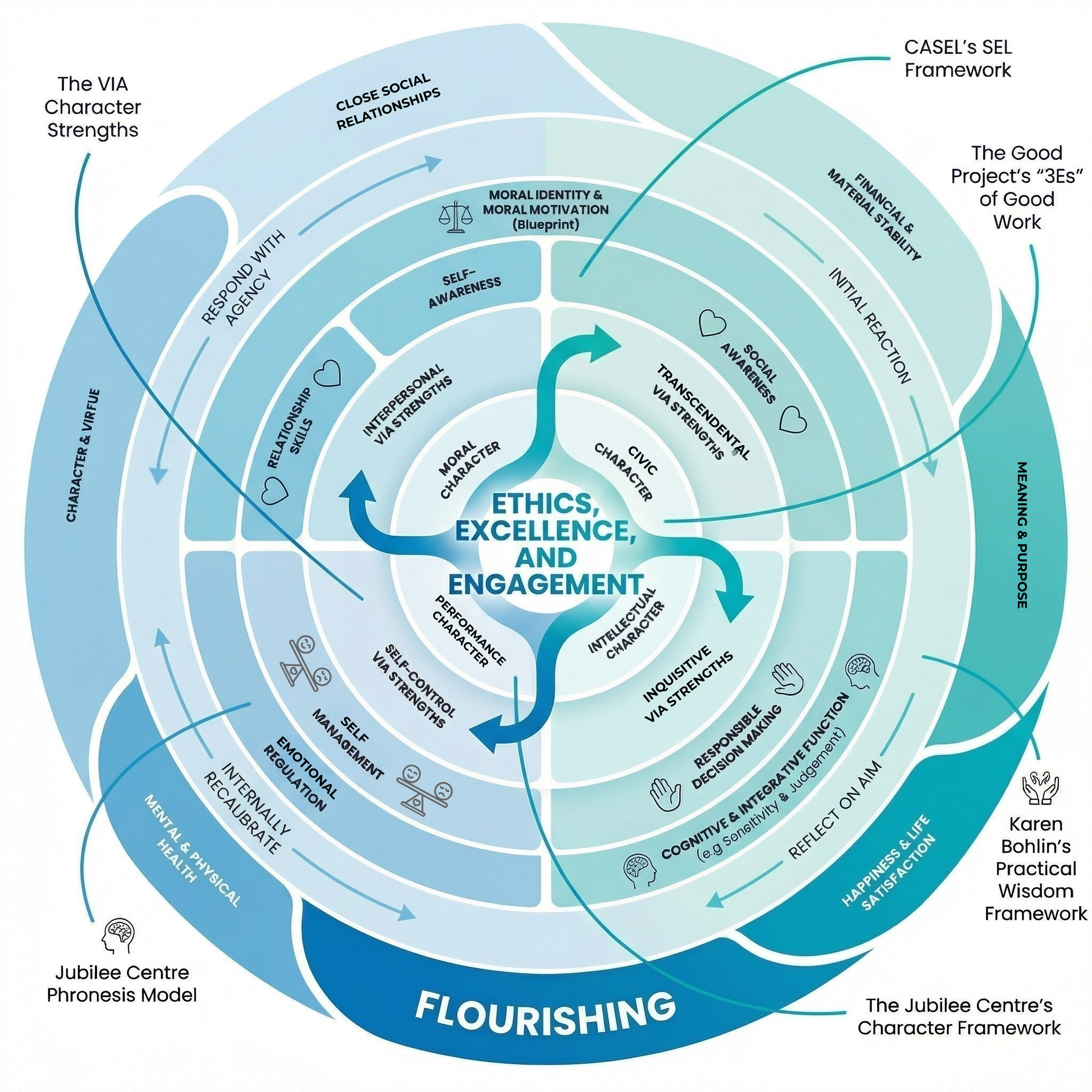Expanding Our Circles of Care
The late Pope’s definition of ordo amoris and the “Rings of Responsibility”
April 29, 2025
Shelby Clark
In a February letter to US bishops, the late Pope Francis wrote: "Christian love is not a concentric expansion of interests that little by little extend to other persons and groups. The true ordo amoris that must be promoted is that which we discover by meditating ... on the love that builds a fraternity open to all, without exception.”
This idea of loving humanity as a rippling effect is familiar to those of us at The Good Project: It appears that, in response to new American immigration policies, Pope Francis called out our “Rings of Responsibility” framework.
Rings of Responsibility: A bullseye made of concentric circles labeled “self” in the center, followed by “others” on the next circle, followed by “community” on the next circle, “profession” on the next circle, and “wider world” on the outermost circle.
The Rings of Responsibility asks individuals to consider: To whom or what are you responsible? In our research we’ve found that some people feel responsible to themselves—their own ideals and values. Others feel responsible for their professions, while others feel responsible for their families and communities. Others might look even wider than this, and talk about their responsibility to their nation or the global world at large. When thinking about our 3Es framework and the “E” of ethics, we’ve asked people to think about responsibility:
What is your responsibility to yourself, and beyond yourself?
How do you think about each of these rings?
Where do you place most of your responsibilities?
A Synchronous, Conceptual Tool
Pope Francis emphasized a Christian love that is inclusive and open to all, noting, “Christians know very well that it is only by affirming the infinite dignity of all that our own identity as persons and as communities reaches its maturity.”
He continued, “In other words: the human person is not a mere individual, relatively expansive, with some philanthropic feelings! The human person is a subject with dignity who, through the constitutive relationship with all, especially with the poorest, can gradually mature in his identity and vocation.”
While we agree, we would also argue that the Rings of Responsibility is a conceptual tool that allows people to be aware of multiple aims: It asks you to consider your own self, your values, your ideals and to be pushing yourself to think beyond yourself towards your broader community, society, and the wider world, ideally at the same time.
We know from our research that this is harder for some than others.
Going “Glocal”
Adolescence is a time of egocentrism and individual identity development. For most early adolescents, this is a time to be thinking more about the self, one’s own values, ideals, and personality. In fact, famed developmental psychologist Erik Erikson argued that, generally, adolescents don’t begin to think about wider social concerns until later adolescence (Flanagan, 2013), and we have seen this in our own research as well. For these students, we can push them to think about the outer ring of responsibility, but it might be harder for them. Just exposing these students to the outer rings of responsibility can be an eye opening experience and a push for them to begin considering broader communities when taking actions.
On the other hand, we’ve also seen through our work with students focused on social responsibility projects, that the more adolescents think about themselves as part of a wider global community, the more they do think about responsibilities beyond themselves.
As part of the Global Citizens Initiative, approximately thirty students from around the world join together each summer to design “Glocal” projects—social entrepreneurship projects that are focused on tackling global issues (poverty, discrimination, the environment) within their local environments. The students speak to how this experience opens their minds, helps them empathize more, and encourages them to gain new perspectives.
Our research shows that, in addition, students evolve during their fellowship experience from being focused on the inner rings of responsibility more towards a broader swath of the Rings of Responsibility.
Some Takeaways and Lingering Questions
Yes, perhaps it is okay to love oneself, but shouldn't we also think beyond ourselves and our responsibilities to the wider world?
How can we gain those broader perspectives? What will help us feel in “fraternity” with others?
What are our shared responsibilities in encouraging the growth of these broader perspectives?
What are the consequences of not doing so?
How do other religions and cultures speak to the ideas of the rings of responsibility and ordo amoris?
All rings of responsibility might not be appropriate for all ages.











